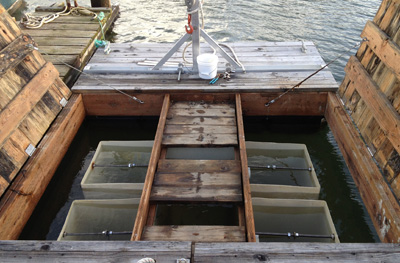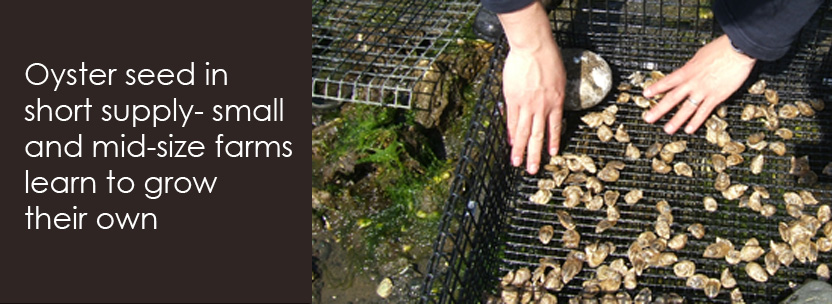|
This project will develop baseline information on environmental influences that affect oyster seed health and survival. Shellfish growers of small and mid-sized farms will be provided with technical training for remote larvae setting and early post-set seed rearing to offset deficiencies in seed supply.
While demand for oysters is on the rise domestically and over-seas, West Coast shellfish growers are facing seed shortages due to poor growth and high mortality at supply hatcheries. Cumulative effects of changing seawater chemistry (e.g. reduced pH and elevated pCO2), and the presence of other common stressors (e.g. Vibrio spp. toxins, an inadequate diet, etc.) may be reducing survivorship of Pacific oyster larvae following settlement and metamorphosis. At the PCSGA Emergency Seed Meeting in Portland, OR in 2013, shellfish growers emphasized the need for research to help understand underlying complexities associated with unpredictable die-offs and poor seed health occurring at hatcheries and during early grow-out stages.

A Floating Upweller System (FLUPSY) designed to protect shellfish seed while they grow large enough to be outplanted in the bay. Our project will investigate optimal site and water quality parameters for FLUPSY installation and operation by small and mid-size growers.
This research will address seed shortage issues by: conducting a cooperative industry oyster seed survival and performance assessment; survey post-set oyster seed health and disease at nursery and remote setting facilities in WA, OR, CA, and AK; evaluate short-term effects of food limitations/stress on seed oysters and establish criteria for feeding and density production standards; inventory and evaluate new and existing systems for remote setting and early post-set seed rearing; refine seed culture methods such as feeding tables by species and size progressions, environmental parameters and rapid on-site diagnosis. This project will conclude with a workshop for shellfish growers to communicate findings and provide technical training in seed rearing, micro-algae culturing and water quality monitoring.
Project Leaders: Bobbi Hudson (PI), Dan Cheney and Aimee Christy from the Pacific Shellfish Institute, Ralph Elston from Aquatechnics, Sequim, WA, Joth Davis from Baywater/Pacific Hybreed, Manchester, WA, Benoit Eudeline from Taylor Shellfish Farms, Quilcene, WA and Leah Paisano from Legoe Bay Shellfish Hatchery, Lummi Is., WA. This project is funded by NOAA Saltonstall-Kennedy grant no. NA16NMF4270262.
Partners:
Project Summary (printable 1-pg PDF)
Support ($) For Seed Health Diagnostics: Funding is available to cover the cost of seed health screening for shellfish farms and hatcheries in WA, OR, CA, and AK. Contact PSI for details. Seed collection and submission instructions are available for the following:
|
|
Report Oyster Mortality:
Recent, large-scale summer mortality events have been occurring in our region. Reporting your mortality event (pdf) will help PSI and regional scientists target possible causes. The information you provide will help direct future research and resources to assist you and other regional shellfish farms. Your information will remain annonymous and kept on file at PSI. Mortality assessments and water quality monitoring may be available, psi@pacshell.org
Project Results Available
|













